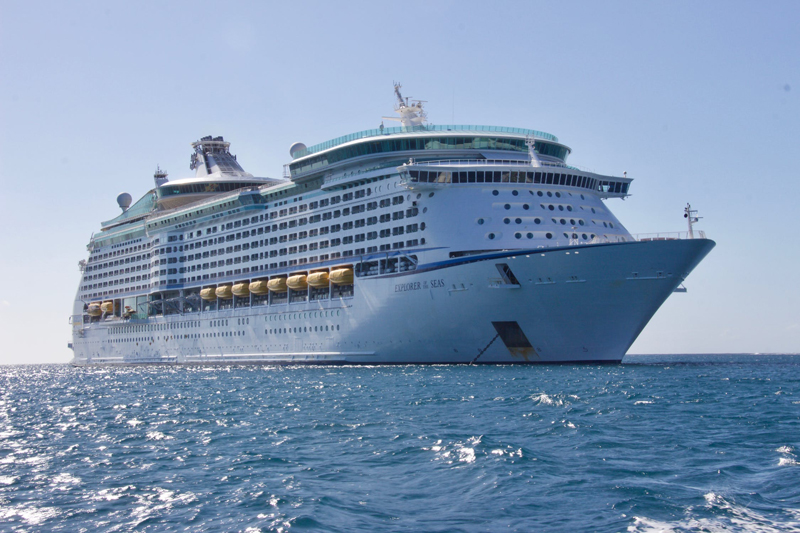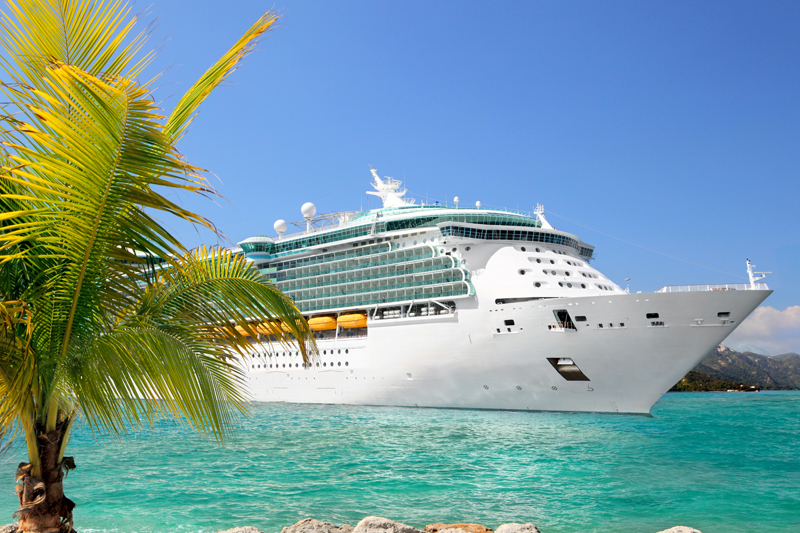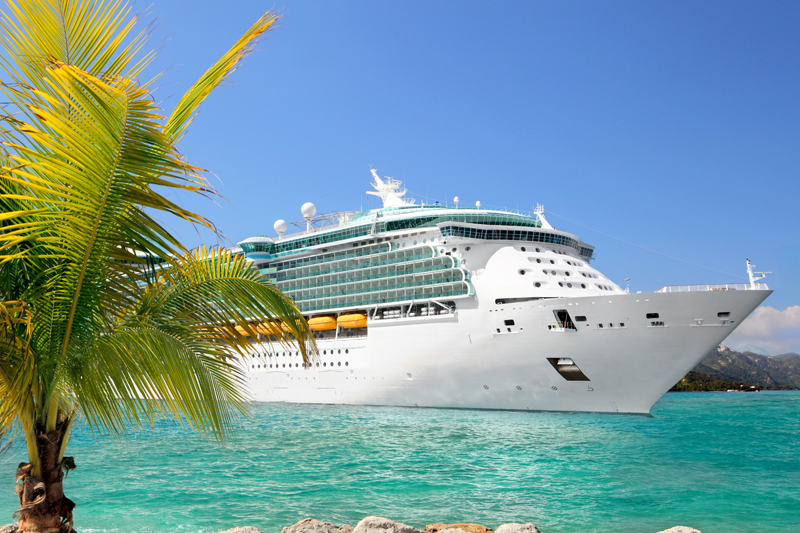10 Tips for Avoiding Novovirus

Novovirus often makes headlines connected with cruise ship vacations, but according to the Center for Disease Control, this highly contagious form of acute gastroenteritis shows up in other locations as well. Outbreaks of novovirus have been reported in hotels and resorts, colleges, theme parks, child care centers, and major sporting events. Unlike these other venues, however, significant novovirus illnesses on cruise ships are required to be reported to health officials.
Although novovirus outbreaks occur in a variety of locations, there are reasons why cruise ships make a good novovirus breeding ground. Cruise ships are contained communities where guests and crew live and dine together, often for a week or more. In addition, sometimes people who are sick are motivated to come on vacation anyway – figuring that they’ll get better quickly. Unfortunately, they often infect others in the process. Spates of novovirus occur most frequently during the winter months and symptoms typically last from 1-3 days.
Here are ten tips for preventing novovirus on your next vacation:
1. Wash your hands as often as possible. Frequent hand washing is the Center for Disease Control’s top recommendation for keeping novovirus at bay. Use hot water, wash your hands thoroughly with plenty of soap for at least 20 seconds, rinse and dry your hands with clean paper towels well. Be particularly careful to wash your hands before brushing your teeth, as well as before and after handling food and eating. Make sure to wash your hands thoroughly after going to the bathroom, returning to your stateroom, and after touching any surfaces commonly used by other cruise guests such as railings, elevator buttons, exercise equipment, public computer keyboards and doorknobs. Also wash your hands after returning from shore excursions. If you do encounter anyone who is sick, wash your hands immediately and launder any clothing items that might have come into contact with them.
2. Take advantage of hand sanitizers. Cruise ships usually have hand sanitizer dispensers located throughout the ship. Use them as often as possible and consider carrying your own as well. In addition, if crew members offer to spray your hands with sanitizer when returning to the cruise ship or entering a buffet area, take them up on their offer. Remember, however, that using hand sanitizers does not take the place of regularly washing your hands. Thorough hand washing is the only effective way to kill novovirus particles.
3. Avoid salads, raw shellfish and uncooked foods. Choose well-cooked foods while on vacation. Salads are often a leading culprit in the spread of gastrointestinal illnesses. As healthy and delicious as they might be, it’s often best to stay away from salads, fresh fruit and raw produce on vacation. The same is true for raw shellfish and chilled food items. Novovirus can be contracted on land in ports of call, so follow these guidelines there as well.
4. Keep your hands away from your face. Individuals who have novovirus can be contagious for as much as several days before and after exhibiting symptoms. One of the easiest ways to pick up novovirus is to touch a contaminated surface, such as a railing or elevator button, and then touch your hand to your mouth or lips. Make a conscious effort to keep your hands away from your face unless they’ve just been thoroughly washed.
5. Don’t share food, drinks or eating utensils. Novovirus can quickly be transmitted by eating food or drinks that have been contaminated by someone who has the illness. This can easily happen in places like buffet areas, where many people use the same serving utensils to load up their plates. Since people can carry the illness before and after they are showing symptoms, it’s best to completely avoid food or drink sharing both on and off the ship.
6. Try to avoid public bathrooms. Bathrooms can be a breeding ground for novovirus if there are sick people in the community. This is true on ships and in other vacation spots as well. Whenever possible, return to your stateroom to go to the bathroom. If you need to use the bathrooms located in the ship’s public areas or when on a shore excursion, wash your hands carefully and use a paper towel to protect your hands when turning off the faucet and opening the door.
7. Refrain from shaking hands. Novovirus is spread rapidly by contact with infected people. That’s one of the reasons why both Holland America Line and Cunard do not allow hand shaking at any of their officer “Meet and Greet” events. Follow their lead and avoid shaking hands with others onboard the ship. If you find you need to do so, wash your hands immediately afterward.
8. Stick to bottled water. Novovirus can be contracted in pre- and post-cruise hotels and on shore excursions, in addition to cruise ships. Opt for bottled water and use plastic cups instead of drinking glasses when possible. This will help guard against water-borne gastrointestinal illnesses as well. Do not drink or refill water bottles from public drinking fountains.
9. Avoid buffets. With their big crowds of thousands of people and common use of serving utensils, the major buffet areas on cruise ships are easy places for viruses to spread. Unfortunately, even though pre-boarding questionnaires designed to detect illnesses are required to be completed, infected passengers can come onboard the ship during embarkation day and subsequently spread their virus. That’s why most cruise lines have hand sanitizer dispensers located in buffet areas and around the ship. Some cruise lines, such as Holland America Line, have taken steps to curb this problem. During the first two days of any Holland America voyage, only crew members are allowed to handle serving utensils and dish out food items in buffet areas. Holland America reports that this has cut down on novovirus outbreaks aboard their cruise ships.
10. Get plenty of rest and stay hydrated. A healthy immune system is an important factor in fighting off any virus. Make sure to drink as much water as possible and get lots of sleep. Currently, there are no vaccines or medical treatment for novovirus. Resting and staying hydrated with water and sports drinks will be very important if you get sick as well.
For more information on novovirus, visit the CDC website at https://www.cdc.gov/norovirus/index.html
Although novovirus outbreaks occur in a variety of locations, there are reasons why cruise ships make a good novovirus breeding ground. Cruise ships are contained communities where guests and crew live and dine together, often for a week or more. In addition, sometimes people who are sick are motivated to come on vacation anyway – figuring that they’ll get better quickly. Unfortunately, they often infect others in the process. Spates of novovirus occur most frequently during the winter months and symptoms typically last from 1-3 days.
Here are ten tips for preventing novovirus on your next vacation:
1. Wash your hands as often as possible. Frequent hand washing is the Center for Disease Control’s top recommendation for keeping novovirus at bay. Use hot water, wash your hands thoroughly with plenty of soap for at least 20 seconds, rinse and dry your hands with clean paper towels well. Be particularly careful to wash your hands before brushing your teeth, as well as before and after handling food and eating. Make sure to wash your hands thoroughly after going to the bathroom, returning to your stateroom, and after touching any surfaces commonly used by other cruise guests such as railings, elevator buttons, exercise equipment, public computer keyboards and doorknobs. Also wash your hands after returning from shore excursions. If you do encounter anyone who is sick, wash your hands immediately and launder any clothing items that might have come into contact with them.
2. Take advantage of hand sanitizers. Cruise ships usually have hand sanitizer dispensers located throughout the ship. Use them as often as possible and consider carrying your own as well. In addition, if crew members offer to spray your hands with sanitizer when returning to the cruise ship or entering a buffet area, take them up on their offer. Remember, however, that using hand sanitizers does not take the place of regularly washing your hands. Thorough hand washing is the only effective way to kill novovirus particles.
3. Avoid salads, raw shellfish and uncooked foods. Choose well-cooked foods while on vacation. Salads are often a leading culprit in the spread of gastrointestinal illnesses. As healthy and delicious as they might be, it’s often best to stay away from salads, fresh fruit and raw produce on vacation. The same is true for raw shellfish and chilled food items. Novovirus can be contracted on land in ports of call, so follow these guidelines there as well.
4. Keep your hands away from your face. Individuals who have novovirus can be contagious for as much as several days before and after exhibiting symptoms. One of the easiest ways to pick up novovirus is to touch a contaminated surface, such as a railing or elevator button, and then touch your hand to your mouth or lips. Make a conscious effort to keep your hands away from your face unless they’ve just been thoroughly washed.
5. Don’t share food, drinks or eating utensils. Novovirus can quickly be transmitted by eating food or drinks that have been contaminated by someone who has the illness. This can easily happen in places like buffet areas, where many people use the same serving utensils to load up their plates. Since people can carry the illness before and after they are showing symptoms, it’s best to completely avoid food or drink sharing both on and off the ship.
6. Try to avoid public bathrooms. Bathrooms can be a breeding ground for novovirus if there are sick people in the community. This is true on ships and in other vacation spots as well. Whenever possible, return to your stateroom to go to the bathroom. If you need to use the bathrooms located in the ship’s public areas or when on a shore excursion, wash your hands carefully and use a paper towel to protect your hands when turning off the faucet and opening the door.
7. Refrain from shaking hands. Novovirus is spread rapidly by contact with infected people. That’s one of the reasons why both Holland America Line and Cunard do not allow hand shaking at any of their officer “Meet and Greet” events. Follow their lead and avoid shaking hands with others onboard the ship. If you find you need to do so, wash your hands immediately afterward.
8. Stick to bottled water. Novovirus can be contracted in pre- and post-cruise hotels and on shore excursions, in addition to cruise ships. Opt for bottled water and use plastic cups instead of drinking glasses when possible. This will help guard against water-borne gastrointestinal illnesses as well. Do not drink or refill water bottles from public drinking fountains.
9. Avoid buffets. With their big crowds of thousands of people and common use of serving utensils, the major buffet areas on cruise ships are easy places for viruses to spread. Unfortunately, even though pre-boarding questionnaires designed to detect illnesses are required to be completed, infected passengers can come onboard the ship during embarkation day and subsequently spread their virus. That’s why most cruise lines have hand sanitizer dispensers located in buffet areas and around the ship. Some cruise lines, such as Holland America Line, have taken steps to curb this problem. During the first two days of any Holland America voyage, only crew members are allowed to handle serving utensils and dish out food items in buffet areas. Holland America reports that this has cut down on novovirus outbreaks aboard their cruise ships.
10. Get plenty of rest and stay hydrated. A healthy immune system is an important factor in fighting off any virus. Make sure to drink as much water as possible and get lots of sleep. Currently, there are no vaccines or medical treatment for novovirus. Resting and staying hydrated with water and sports drinks will be very important if you get sick as well.
For more information on novovirus, visit the CDC website at https://www.cdc.gov/norovirus/index.html

Related Articles
Editor's Picks Articles
Top Ten Articles
Previous Features
Site Map
Content copyright © 2023 by Nancy Schretter. All rights reserved.
This content was written by Nancy Schretter. If you wish to use this content in any manner, you need written permission. Contact Nancy Schretter for details.






